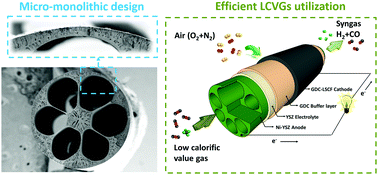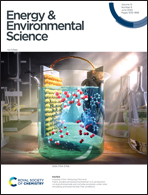High-performance fuel cell designed for coking-resistance and efficient conversion of waste methane to electrical energy†
Abstract
Utilization or emission of low calorific value gases (LCVGs) containing <20% CH4 constitute economic and environmental challenges. Ceramic fuel cells offer a possible solution, but their performance is hindered by carbon formation (‘coking’). Herein, we report a novel fuel cell designed to mitigate coking, yielding superior performances but using conventional commercially-available materials. The new micro-monolithic design has an extraordinary geometrical asymmetry that separates the mechanical support and anode current collector from the electrochemically active region and results in significantly facilitated mass transport, yielding power densities of 1.77–2.22 W cm−2 using LCVGs. In addition, the effluent containing only H2, CO and CO2 is of great industrial interest for methanol synthesis, if their ratios are adjusted appropriately. The new fuel cell developed was almost free from coke deactivation and was stable for over 500 h, indicating great promise for both efficient and environmentally benign use of LCVGs.



 Please wait while we load your content...
Please wait while we load your content...